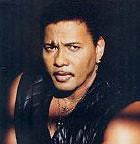Five Questions With Aaron Neville
By Celia Herrera, AOL Black Voices
Hard To Stop The Big Easy
Crescent City's Favorite Son
Just after the anniversary of Hurricane Katrina, Crescent City's favorite son gears up to release 'Bring It On Home' on Sept. 19, an album he says is sprinkled with the "old school."
The idea of performing at countless benefit concerts sounds like a lot of work for a legendary singer who's going on five decades in the business, but for this Crescent City favorite son, it was all he could do to stop from losing hope that his hometown be reborn.
Aaron Neville's place in the pantheon of Big Easy musical legends is unparalleled.
The younger brother of Meters founder, Art Neville, he first burst on the scene in 1966 with his ballad 'Tell It Like It Is' and came to greater fame in the '70s as the lead singer for the Neville Brothers which includes brothers Aaron, Charles, Cyril and Art.
On Sept. 19, Neville will release 'Bring It On Home,' a medley of classic soul tunes. "The music has helped," said the crooner when he sat down with Black Voices to talk about his role in the rebuilding of New Orleans:
BV: You said about 'Bring It On Home,' "These classic songs have been pumping blood to my heart from the first second I heard them. They've been a part of my life. Singing them, especially in the aftermath of Katrina, was a deeply spiritual experience. They helped me get through. They gave me hope. And for me, music has always been about hope." With that in mind, what's been your spiritual journey around recording Sam Cooke's 'A Change Is Gonna Come' and Curtis Mayfield's 'People Get Ready.' What kind of changes are you looking for in New Orleans, in the world?
AN: We've been looking for peace and brotherhood for a long time, but I don't know how soon we're going to get it. As far as New Orleans, I hope for it to come back to being a city one day. Another part that I grew up in will never be there anymore, but I'd like to see it come back for the people that live there.
BV: You've collaborated with so many artists, and on this album Chaka Khan. Any stories or memories you can share about working with some of these legends?
AN: [Chaka] is a great singer. It was an honor to be singing with her. Otis Redding, I got to chill on tour with him for a month, the same year he died. To be able to meet this guy, and sing his stuff today - that was a great time in my life. Curtis Mayfield was in a hotel in New York, and I got to sit with him for about an hour. He was on his back, he couldn't move. I let him know he was one of my heroes. I was singing some of his songs. I was coming up with songs that he had probably forgot about; it would bring a smile to him. That was a special hour that I spent with Curtis Mayfield.
Centered in the Storm
With biting wit and thoughtful research, academic Michael Eric Dyson takes us all to task in his book, 'Come Hell or High Water: Hurricane Katrina and the Color of Disaster.'
11 Questions for Dyson
BV: What's the first single you are releasing off of 'Bring It On Home' and why?
AN: I did a video for 'Ain't No Sunshine,' so they might use that one. We changed it up. We took out the 'I know, I know I know...' out -- kind of made it a ballad.
BV: You've said: "This is a strange moment in my career. Since Katrina I've devoted months and months to benefit concerts-and that's been a blessing. My profile and the profiles of my brothers have been raised by the storm. People all over the world see us as the face of New Orleans. They want to hear us play. They want to feel that we've survived the storm. They want to be assured that life goes on." That's a lot of pressure. Is it hard not to get overwhelmed by everything?
AN: New Orleans musicians -- they're all displaced. I would run across them, and they all had the same look in their eyes, we've lost something big. It took more than our homes; it took a city, a culture. I know there are things happening all over the world, and I think about that too. But I have to think about New Orleans. That's where I was born and raised. You can't kill the music. The music is in our hearts and souls, and it's going to continue. It's still alive in the people. It's not overwhelming, we've just got to keep doing what we're doing and helping the people we can help. Regardless of what's happening I'm going to be on stage playing the music for the people. We're getting just as much out of it as they are. We're going to continue to do benefits and just hope the money is getting to the people.
BV: Houston took in 150,000 evacuees - the most of any U.S. city. Houston police believe the evacuees are partly responsible for a nearly 17.5 percent increase in homicides this past year. What do you think about what the Houston police are reporting?
AN: That could be part of it. At the time, New Orleans had a lot of killings going on. People didn't want to go out. Me and a friend of mine, we used to shoot pool sometimes. We stopped doing that because of the killings. It was mostly gang and drug related. It's possible that they could be fighting over territory in Houston. That could be the problem. But that's everywhere now.
2006-06-09 11:19:29

No comments:
Post a Comment